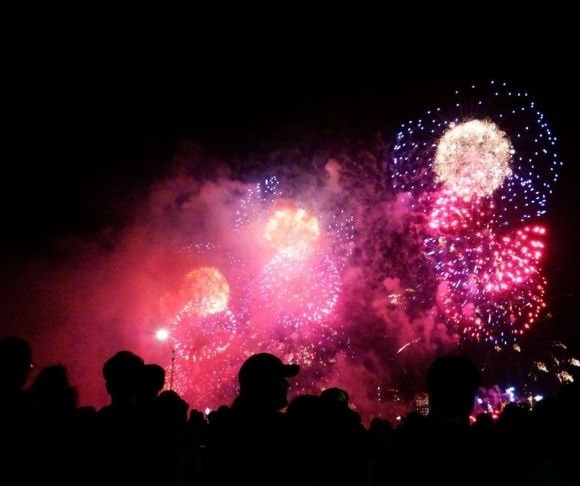Fireworks and the Fourth go back to the very first anniversary of American independence, July 4, 1777. Back in those days, 13-cannon salutes in honor of the 13 colonies-turned-states were far more common, though eventually more spectacular pyrotechnic displays with far less destructive capabilities were substituted. The tradition continues today, even if it is more tightly moderated than before.
Fireworks are regulated in a few ways at the federal level. The ATF controls what it calls “display fireworks,” which include large fireworks used in shows – generally under the supervision of trained pyrotechnicians. “Consumer fireworks” are the smaller items usually sold at stands around the Fourth of July. The ATF doesn’t regulate these, but the US Consumer Product Safety Commission does.
We mere consumers are, therefore, rather limited by the federal government in the amount of bang we’re allowed to get for our bucks. Still, there remain a good many options for an explosively good time – if one is fortunate enough to live in the right state. Ironically, as muzzleloading, black powder-powered cannons are not outlawed by either the Republic or any of the 50 states, the original 13-gun salute is technically more legal in some parts of the country than firecrackers – assuming certain precautions are taken, of course.
Fun for All Ages – Well, Depending on Location
New Hampshire and Maine age-restrict fireworks to purchasers 21 or older – and both states fall under the no aerial list, to boot. Nearly half of the states – 23 – require buyers to be at least 18, while another 16 permit 16-year-olds to shop. The minimum age is 15 in Louisiana, 14 in Missouri, and 12 in Arkansas, Mississippi, North Dakota, and Oklahoma.
Bans, No Fly Zones, and Other Restrictions
Only Massachusetts bans all fireworks outright – but there are a few other states that might as well, for all the Independence Day liberty they leave. Fireworks are legal in Rhode Island, for example, but only to a permit holder. Four states restrict chemical composition. In South Dakota, firecrackers are banned, along with any other firework containing any amount of nitroglycerin, dynamite, or giant powder. Virginia doesn’t allow anything that explodes, and Florida only allows items without any explosive or flammable compounds. California has a massive list of forbidden chemicals.
 Six states – Colorado, Connecticut, Delaware, Idaho, Maryland, and New Jersey – have approved fireworks lists, with all other items banned. Eight states have overall size or charge limits, as well. For example, Nebraska forbids any explosive with more than 50 mg of powder, while Utah allows up to 500 grams. Texas and New Mexico both prohibit fireworks over a certain size, as defined by the overall length and diameter of the item itself – and South Carolina considers certain items too small.
Six states – Colorado, Connecticut, Delaware, Idaho, Maryland, and New Jersey – have approved fireworks lists, with all other items banned. Eight states have overall size or charge limits, as well. For example, Nebraska forbids any explosive with more than 50 mg of powder, while Utah allows up to 500 grams. Texas and New Mexico both prohibit fireworks over a certain size, as defined by the overall length and diameter of the item itself – and South Carolina considers certain items too small.
Arizona, Georgia, Hawaii, Illinois, Kansas, Maine, Minnesota, Montana, Nevada, New Hampshire, New York, North Carolina, Oklahoma, Oregon, Vermont, Washington, and Wisconsin each have some degree of ban on bottle rockets and other aerial displays. That’s a whopping 17 states that don’t want firecrackers whizzing through the air. Hawaii also includes ground items that move far enough to leave a circle with a 12-foot radius of where they are placed. Illinois has a problem with handheld fireworks, as well, and Kansas doesn’t allow any rocket on a stick. In Georgia, there can be no balloon, bag, parachute, or other aerial device that requires fire for propulsion, and it’s also illegal to release any floating lantern or wish lantern illuminated by flame on any public waterway. Nevada adds to the list anything that explodes on impact, and Maine prohibits items that produce colored smoke.
Let Freedom Ring
Just over a quarter of the nation is free of any firework prohibitions beyond what’s already banned by the US government. However – as could be the case in any state – some of the larger cities, which tend to have more rules and allow less liberty in general, may ban or restrict fireworks. Take Alaska, for example. Anchorage bans fireworks entirely except in limited areas on New Year’s Eve. While the Last Frontier is usually wide open in its more rural areas, however, this Independence Day, there will be no legal fiery festivities in much of south-central and interior Alaska. The state issued an emergency burn closure starting at 11:59 p.m. Friday due to the extremely dry conditions.

(Photo by Alexi Rosenfeld/Getty Images)
Alaska, Arkansas, Indiana, Iowa, Kentucky, Michigan, Mississippi, North Dakota, Ohio, Pennsylvania, Tennessee, West Virginia, and Wyoming are the 13 states without prohibited lists of their own, and the minimum purchase age varies widely.
Arkansas, Mississippi, and North Dakota, on the other hand, are the triumvirate of fireworks freedom. Anything that isn’t federally banned is allowed, and anyone 12 or older can buy them from any roadside stand or tent – of which there is certainly no shortage, at least not in central Arkansas. For this writer’s own holiday shopping, a simple trip out of the office and across the parking lot sufficed – and there is another tent on the five-minute drive home!
Whatever your state, chances are there’s some way to honor the day with a bang – if not with fireworks, then perhaps a bonfire or BBQ. Check your state and local laws and, of course, be safe in whatever you do. And if all else fails, there’s always the cannon (yep, still legal) – a true American classic.




